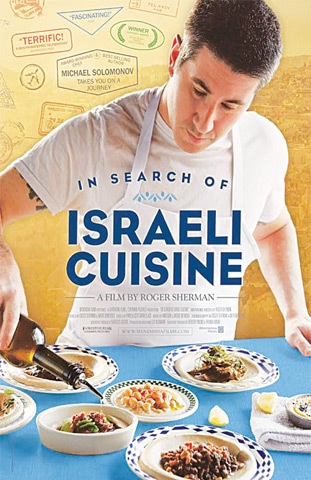
In the documentary In Search of Israeli Cuisine, restaurateur and chef Michael Solomonov travels from Tel Aviv to Jerusalem looking for what makes Israeli cooking unique. That’s not easy, even in a New Jersey-size nation less than a century old — and one that has only begun to get into foodie culture during the last 30 or so years.
Solomonov journeys all across Israel, uncovering a country rich with its own ingredients, but whose dishes are influenced by any number of nearby countries — such places as Yemen, Spain and Turkey — where Israelis travelled during the economic boom of the 1980s.
Through the use of archival photographs and interviews with journalists and chefs, Solomonov investigates how a country that once saw food as simply utilitarian has turned into a destination that attracts diners from around the world. He consumes fresh fish in one seaside city and snacks on desert-grown fruit just a short drive away. He sits down to enjoy Mediterranean-influenced salads, hummus and lamb in restaurants run by Sephardic Jews but also samples traditional noodle kugel with an Ashkenazic cook.
Solomonov speaks with local farmers, vintners, chefs and kosher families on their home turf, and they provide much of the colour — though not much clarity. “So you’re Kurdish and Turkish, born in Tel Aviv, and we’re doing a play off gefilte fish by using white tuna. So this is Israeli cuisine, right?” Solomonov asks Yaffo-Tel Aviv chef Haim Cohen.
“I hope so,” Cohen replies.
These interviews show the wide range of traditions and backgrounds in Israel, such as the owner of a kosher winery who can’t touch his own product in the barrel and a Palestinian chef who laments that his restaurant suffers every time there is a politically fraught event.
But like the graphics that intermittently appear as Solomonov travels (and which look like the first Google Image result for “Israel map”), the documentary proves slightly underwhelming. In a world of bombastic Anthony Bourdains and Food Network shows, it’s hard to get excited by a calm man like Solomonov who simply closes his eyes and nods every time he tastes something he likes — or gives a hug, if you’re lucky.
For Solmonov, this film is more about the journey than the destination. For the audience, it can feel frustrating to be told that the answer is that there is no answer.
—By arrangement with The Washington Post
Published in Dawn, April 21st, 2017














































Dear visitor, the comments section is undergoing an overhaul and will return soon.